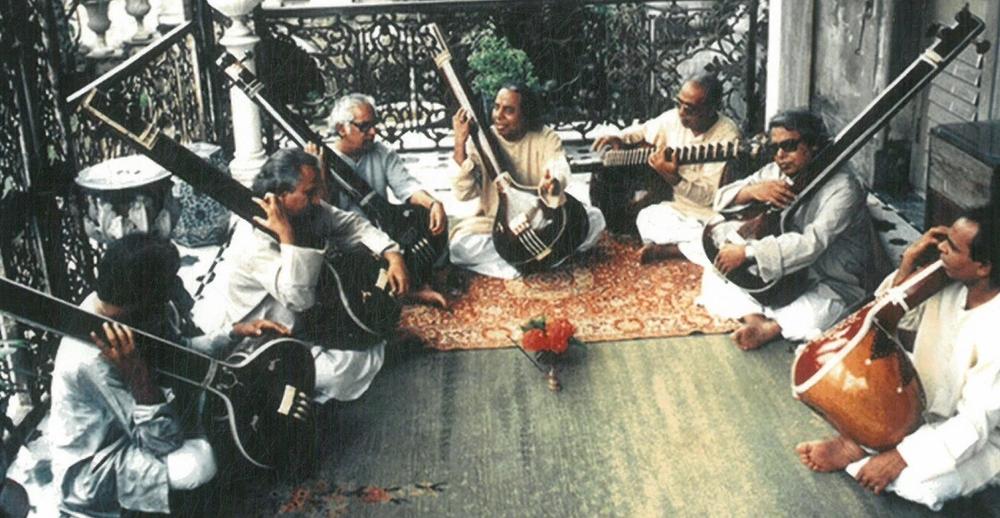The ancient Dhrupad retains its age-old gravitas amid alterations over generations, notes a seminar of a recent online festival
Dhrupad continues to change with its advancement as Indian subcontinent’s most ancient classical music, yet its spirit and substance retain the age-old gravitas, a seminar noted. Listeners and students of the meditatively sonorous art-form have increased in the 21st century though the trend doesn’t necessarily imply a better quality, according to speakers at the event last week.
Five senior Dhrupad exponents of the country aired their views at the virtual symposium organised as part of a cultural festival that concluded last weekend. Vocalists Ritwik Sanyal, Prem Kumar Mallick, Wasifuddin Dagar, Kaberi Kar and Uday Bhawalkar spoke on ‘Dhrupad Yatra Since Vedic Times’, moderated by author-critic Manjari Sinha. The penultimate-leg symposium was a highlight of the five-day online festival.
Organised by the Ustad Imamuddin Khan Dagar Indian Music, Art & Culture Society in association with the Union Ministry of Culture, the December 21-25 ‘Dhrupad Yatra’ had its programmes telecast live. The hands-on role over social media was performed by Gunijan Sabha, known for its activities aimed at enriching interactions between maestros and aesthetes of Indian tradition. The 2003-founded heritage forum based in Jaipur has been running a Delhi chapter for the past five years.
How notes travel
Scholars at the seminar, which coincided with Christmas-eve, reiterated that Dhrupad remains the foundation for Indian classical music even as its northern system saw a steady nourishment of the khayal stream since the 14th century following the contributions of Sufi poet Amir Khusrau. “Dhrupad can never be popular in the general way we use the term,” said Prof Kar, who teaches Hindustani music at Visva-Bharati University in Santiniketan. “It is for a niche audience — initiated, sensitive and with a penchant for introspection.”
Delhi-based Wasifuddin Dagar, while emphasising the role of the tanpura as aadhaar (fundamental), said Dhrupad vocal relies heavily on the abdomen and diaphragm as well. “From where a note emerges within and how it travels up the body before the throat produces the sound is integral to the system,” he added.
The microtonal gamaks of his immediate forefathers such as Moinuddin Dagar and Fariduddin Dagar themselves differed in subtleties, middle-aged Wasifuddin recalled, pointing out that a Dhrupad school (bani) does not stick to the same performative ideas. “While treatises put the kinds of gamak as 18, our bani follows only 15,” he added.
Veteran Prof Sanyal, who taught at Banaras Hindu University, stressed on the profundity of Dhrupad as the source of all other Indian classical music idioms. “Its alaaps are so expansive and imaginative they are an art in themselves,” he said. “After the Vedic period, Dhrupad kept acquiring different shade in its meanings with changing times.”
Mallick, renowned for his mastery in the Darbhanga bani, spoke on the emergence of Dhrupad from Haveli Sangeet rendered in temples. Bhawalkar, groomed in the Dagar style, said Dhrupad revelled in a “range of voices” and that refinement of them should be the ultimate pursuit for a vocalist. “Of late, the fora for Dhrupad has risen. Also, there are more students than it used to be, say, 50 years ago,” he added.
Concerts and an exhibition
Shabana Dagar, the chief organiser of ‘Dhrupad Yatra’, described the five-day festival as a stride in the Dagar Society’s sustained efforts towards the promotion of Indian culture. “Besides music, the organisation provides platforms to dances and other performing arts,” she added.
The festival began with a vocal rendition by Pelva Naik of Mumbai, followed by the concerts of Dagar Brothers (Nafisuddin-Anisuddin of Jaipur) and Prem Kumar Mallick (Allahabad). The session was dedicated to khayal vocalist Iqbal Ahmed Khan of Dilli gharana, who passed away last week.
The second day’s vocalists were Nirmalya Dey, Kaberi Kar and Ritwik Sanyal. On December 23, Mallick Brothers (Prashant and Nishant of Delhi) sang, followed by Uday Bhawalkar and Wasifuddin Dagar. The pakhawaj players at the festival were Anil Choudhary, Mohan Shyam Sharma, Pratap Awad, Aditya Dip and Sukhad Munde.
The concluding day of ‘Dhrupad Yatra’ hosted a virtual exhibition of paintings by Bahrain-based Preeti Rana. In conversation with the artist were scholar Shailaja Khanna along with Aditya Parwatkar of ZEE5.

